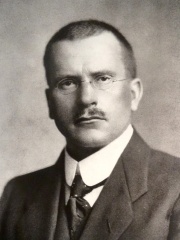
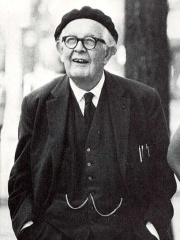
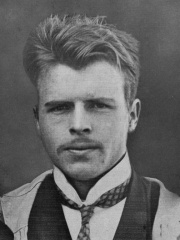
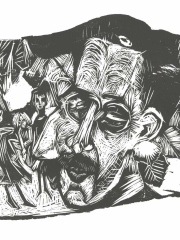
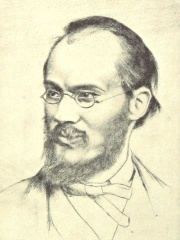

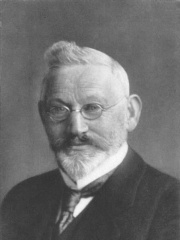
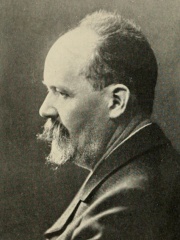
The Most Famous
PSYCHOLOGISTS from Switzerland
This page contains a list of the greatest Swiss Psychologists. The pantheon dataset contains 235 Psychologists, 9 of which were born in Switzerland. This makes Switzerland the birth place of the 6th most number of Psychologists behind Austria, and France.
Top 9
The following people are considered by Pantheon to be the most legendary Swiss Psychologists of all time. This list of famous Swiss Psychologists is sorted by HPI (Historical Popularity Index), a metric that aggregates information on a biography's online popularity.

1. Carl Jung (1875 - 1961)
With an HPI of 85.60, Carl Jung is the most famous Swiss Psychologist. His biography has been translated into 110 different languages on wikipedia.
Carl Gustav Jung ( YUUNG; Swiss Standard German: [karl jʊŋ]; 26 July 1875 – 6 June 1961) was a Swiss psychiatrist, psychotherapist, and psychologist who founded the school of analytical psychology. A prolific author of over twenty books, illustrator, and correspondent, Jung was a complex and convoluted academic, best known for his concept of archetypes. Alongside contemporaries Sigmund Freud and Alfred Adler, Jung became one of the most influential psychologists of the early 20th century and has fostered not only scholarship, but also popular interest. Jung's work has been influential in the fields of psychiatry, anthropology, archaeology, literature, philosophy, psychology, and religious studies. He worked as a research scientist at the Burghölzli psychiatric hospital in Zurich, under Eugen Bleuler. Jung established himself as an influential mind, developing a friendship with Freud, founder of psychoanalysis, conducting a lengthy correspondence paramount to their joint vision of human psychology. Jung is widely regarded as one of the most influential psychologists in history. Freud saw the younger Jung not only as the heir he had been seeking to take forward his "new science" of psychoanalysis but as a means to legitimize his own work: Freud and other contemporary psychoanalysts were Jews facing rising antisemitism in Europe, and Jung was raised as Christian, although he did not strictly adhere to traditional Christian doctrine, he saw religion, including Christianity, as a powerful expression of the human psyche and its search for meaning. Freud secured Jung's appointment as president of Freud's newly founded International Psychoanalytical Association. Jung's research and personal vision, however, made it difficult to follow his older colleague's doctrine, and they parted ways. This division was painful for Jung and resulted in the establishment of Jung's analytical psychology, as a comprehensive system separate from psychoanalysis. Among the central concepts of analytical psychology is individuation—the lifelong psychological process of differentiation of the self out of each individual's conscious and unconscious elements. Jung considered it to be the main task of human development. He created some of the best-known psychological concepts, including synchronicity, archetypal phenomena, the collective unconscious, the psychological complex, and extraversion and introversion. His treatment of American businessman and politician Rowland Hazard in 1926 with his conviction that alcoholics may recover if they have a "vital spiritual (or religious) experience" played a crucial role in the chain of events that led to the formation of Alcoholics Anonymous. Jung was an artist, craftsman, builder, and prolific writer. Many of his works were not published until after his death, and some remain unpublished.

2. Jean Piaget (1896 - 1980)
With an HPI of 82.27, Jean Piaget is the 2nd most famous Swiss Psychologist. His biography has been translated into 87 different languages.
Jean William Fritz Piaget (UK: , US: ; French: [ʒɑ̃ pjaʒɛ]; (9 August 1896 – 16 September 1980) was a Swiss psychologist known for his work on child development. Piaget's theory of cognitive development and epistemological view are together called genetic epistemology. Piaget placed great importance on the education of children. As the Director of the International Bureau of Education, he declared in 1934 that "only education is capable of saving our societies from possible collapse, whether violent, or gradual". His theory of child development has been studied in pre-service education programs. Nowadays, educators and theorists working in the area of early childhood education persist in incorporating constructivist-based strategies. Piaget created the International Center for Genetic Epistemology in Geneva in 1955 while on the faculty of the University of Geneva, and directed the center until his death in 1980. The number of collaborations that its founding made possible, and their impact, ultimately led to the Center being referred to in the scholarly literature as "Piaget's factory". According to Ernst von Glasersfeld, Piaget was "the great pioneer of the constructivist theory of knowing". His ideas were widely popularized in the 1960s. This then led to the emergence of the study of development as a major sub-discipline in psychology. By the end of the 20th century, he was second only to B. F. Skinner as the most-cited psychologist.

3. Hermann Rorschach (1884 - 1922)
With an HPI of 72.22, Hermann Rorschach is the 3rd most famous Swiss Psychologist. His biography has been translated into 51 different languages.
Hermann Rorschach (Swiss Standard German: [ˈhɛrman ˈroːrʃaχ]; 8 November 1884 – 2 April 1922) was a Swiss psychiatrist and psychoanalyst. His education in art helped to spur the development of a set of inkblots that were used experimentally to measure various unconscious parts of the subject's personality. His method has come to be referred to as the Rorschach test, iterations of which have continued to be used over the years to help identify personality, psychotic, and neurological disorders. Rorschach continued to refine the test until his premature death at age 37.

4. Ludwig Binswanger (1881 - 1966)
With an HPI of 66.82, Ludwig Binswanger is the 4th most famous Swiss Psychologist. His biography has been translated into 25 different languages.
Ludwig Binswanger (; Swiss Standard German: [ˈbɪnsvaŋər]; 13 April 1881 – 5 February 1966) was a Swiss psychiatrist and pioneer in the field of existential psychology. His parents were Robert Johann Binswanger (1850–1910) and Bertha Hasenclever (1847–1896). Robert's German-Jewish father Ludwig "Elieser" Binswanger (1820–1880) was founder, in 1857, of the Bellevue Sanatorium in Kreuzlingen. Robert's brother Otto Binswanger (1852–1929) was a professor of psychiatry at the University of Jena. Ludwig Binswanger is the most prominent phenomenological psychologist and the most influential in making the concepts of existential psychology known in Europe and the United States.
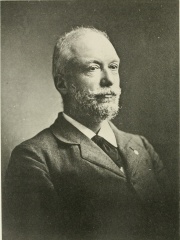
5. Auguste Forel (1848 - 1931)
With an HPI of 66.27, Auguste Forel is the 5th most famous Swiss Psychologist. His biography has been translated into 27 different languages.
Auguste-Henri Forel (French pronunciation: [oɡyst ɑ̃ʁi fɔʁɛl]; 1 September 1848 – 27 July 1931) was a Swiss myrmecologist, neuroanatomist, psychiatrist and former eugenicist, notable for his investigations into the structure of the human brain and that of ants. He is considered a co-founder of the neuron theory. Forel is also known for his early contributions to sexology and psychology. From 1978 until 2000 Forel's image appeared on the 1000 Swiss franc banknote.

6. Édouard Claparède (1873 - 1940)
With an HPI of 64.32, Édouard Claparède is the 6th most famous Swiss Psychologist. His biography has been translated into 22 different languages.
Édouard Claparède (French: [klapaʁɛd]; 24 March 1873 – 29 September 1940) was a Swiss neurologist, child psychologist, and educator.

7. Edgar Schein (1928 - 2023)
With an HPI of 58.89, Edgar Schein is the 7th most famous Swiss Psychologist. His biography has been translated into 16 different languages.
Edgar Henry Schein (March 5, 1928 – January 26, 2023) was a Swiss-born American business theorist and psychologist who was professor at the MIT Sloan School of Management. He was a foundational researcher in the discipline of organizational behavior, and made notable contributions in the field of organizational development in many areas, including career development, group process consultation, and organizational culture. He was the son of former University of Chicago professor Marcel Schein.

8. Otto Binswanger (1852 - 1929)
With an HPI of 58.30, Otto Binswanger is the 8th most famous Swiss Psychologist. His biography has been translated into 17 different languages.
Otto Ludwig Binswanger (; Swiss Standard German: [ˈbɪnsvaŋər]; 14 October 1852, Scherzingen, Münsterlingen – 15 July 1929, Kreuzlingen) was a Swiss psychiatrist and neurologist who came from a famous family of physicians; his father was founder of the Kreuzlingen Sanatorium, and he was uncle to Ludwig Binswanger (1881–1966) who was a major figure in the existential psychology movement. He was brother-in-law to physiotherapist Heinrich Averbeck (1844–1889). Other notable family members include his son-in-law Hans-Constantin Paulssen (1892-1984), who was the first president of the BDA (Bundesvereinigung der Deutschen Arbeitgeberverbände) (Confederation of German Employers' Associations).

9. Théodore Flournoy (1854 - 1920)
With an HPI of 56.99, Théodore Flournoy is the 9th most famous Swiss Psychologist. His biography has been translated into 16 different languages.
Théodore Flournoy (15 August 1854 – 5 November 1920) was a Swiss professor of psychology at the University of Geneva and author of books on parapsychology and spiritism. He studied a wide variety of subjects before he devoted his life to psychology. He did extensive observations on a participant to investigate psychical phenomena. He was the President of the Sixth International Congress of Psychology, the Chair of Experimental Psychology at the University of Geneva in 1891 and was the first professor of psychology in Europe to become a member of the Faculty of Sciences instead of the Faculty of Philosophy.
People
Pantheon has 9 people classified as Swiss psychologists born between 1848 and 1928. Of these 9, none of them are still alive today. The most famous deceased Swiss psychologists include Carl Jung, Jean Piaget, and Hermann Rorschach.
Deceased Swiss Psychologists
Go to all RankingsCarl Jung
1875 - 1961
HPI: 85.60
Jean Piaget
1896 - 1980
HPI: 82.27
Hermann Rorschach
1884 - 1922
HPI: 72.22
Ludwig Binswanger
1881 - 1966
HPI: 66.82
Auguste Forel
1848 - 1931
HPI: 66.27
Édouard Claparède
1873 - 1940
HPI: 64.32
Edgar Schein
1928 - 2023
HPI: 58.89
Otto Binswanger
1852 - 1929
HPI: 58.30
Théodore Flournoy
1854 - 1920
HPI: 56.99
Overlapping Lives
Which Psychologists were alive at the same time? This visualization shows the lifespans of the 9 most globally memorable Psychologists since 1700.

